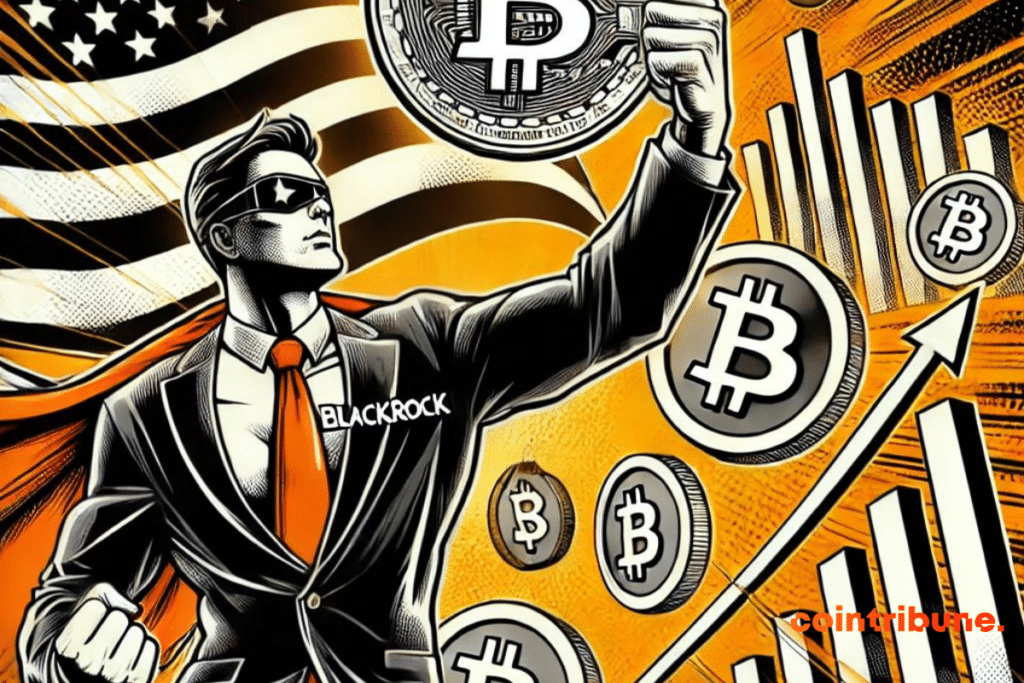Bitcoin: BlackRock Catapults The United States To The Top!
Last Wednesday, a massive new acquisition by BlackRock shook the bitcoin market, with an impressive purchase of 2,913 BTC, representing $184.3 million. This move comes in the context of a rebound in inflows to exchange-traded funds (ETFs) in the United States, an undeniable sign of growing interest in bitcoin. The acquisition by the asset management giant not only reaffirms BlackRock’s dominance in the crypto space but also strengthens the United States’ position as the undisputed leader in the Bitcoin market.

BlackRock and Bitcoin: A Strategic Alliance to Dominate the Market
BlackRock, known for its influence on global financial markets, has made a bold choice by betting on Bitcoin.
Last Wednesday’s purchase marks a new phase in the company’s strategy, which now holds an impressive total of 359,279 BTC, worth approximately $23 billion.
This acquisition, the most significant made in a single day in September, demonstrates a desire to bolster its position in the cryptocurrency market, an initiative that appears to have paid off.
The resurgence of interest in Bitcoin ETFs in the United States has played a key role in this dynamic. After a slowdown observed in July, inflows have resumed significantly, driven by pent-up demand for indirect exposure to Bitcoin.
BlackRock, with its iShares Bitcoin Trust (IBIT), has been able to capitalize on this growing demand by consolidating its dominant position among Bitcoin ETF issuers. This strategic maneuver now places the United States at the top of the market, far surpassing players like MicroStrategy, which holds 107,059 fewer BTC.
This rise of BlackRock in the crypto market reflects a broader trend: the United States is becoming a critical hub for institutional Bitcoin investors.
This growing enthusiasm for Bitcoin ETFs indicates a profound change in the perception of Bitcoin, once seen as a risky alternative, and now considered a serious and promising investment asset.
ETFs: A Driver for U.S. Growth
BlackRock’s acquisition not only strengthens the company’s position; it also highlights a broader phenomenon, the resurgence of Bitcoin ETFs in the United States.
Indeed, exchange-traded funds dedicated to bitcoin had initially seen a booming start, with record net inflows in March and June, before experiencing a temporary slowdown. But this lull was short-lived.
Since then, ETFs have regained momentum, recording consecutive capital inflows over several days. This rebound culminated last Wednesday with a total of $105.8 million of inflows in a single day.
Among these flows, the BlackRock iShares Bitcoin Trust and the Bitwise Bitcoin ETF stand out as the only products to have recorded net inflows that day, while others, like Fidelity and Ark 21Shares, experienced outflows.
This contrast marks a clear distinction between the winners and losers in this rapidly evolving market.
This renewed interest in Bitcoin ETFs merely underscores the renewed appetite among institutional investors for cryptos.
The 30-day indicators now show positive flows, confirming a trend reversal after a difficult period.
Investors seem more eager than ever to integrate bitcoin into their portfolios, whether through direct exposure or via derivative products like ETFs.
Maximize your Cointribune experience with our "Read to Earn" program! For every article you read, earn points and access exclusive rewards. Sign up now and start earning benefits.

Fascinated by Bitcoin since 2017, Evariste has continuously researched the subject. While his initial interest was in trading, he now actively seeks to understand all advances centered on cryptocurrencies. As an editor, he strives to consistently deliver high-quality work that reflects the state of the sector as a whole.
The views, thoughts, and opinions expressed in this article belong solely to the author, and should not be taken as investment advice. Do your own research before taking any investment decisions.